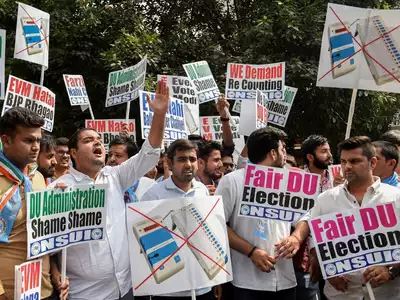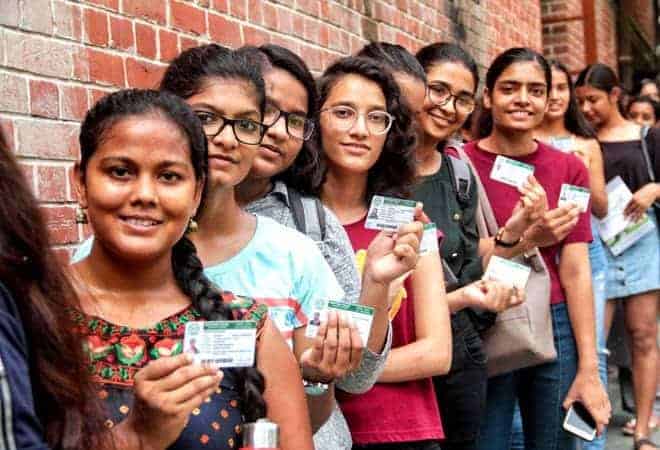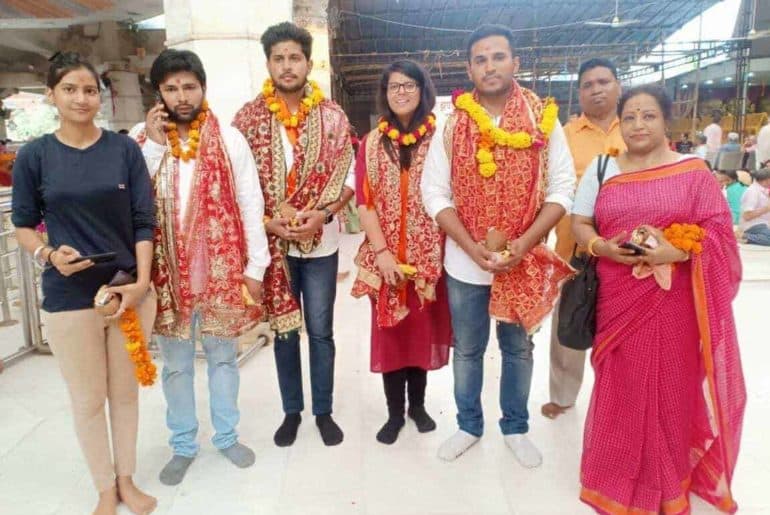If we turn the pages of our history, we will realise that our freedom struggle was an essential chapter in the history of the University of Delhi. It has been about 80 years since Mahatma Gandhi gave us the slogan “Do or Die”, and within weeks of the pronouncement of the slogan at the Bombay Session of 1942, protests started to take shape across the colleges of DU. From burning down an electric sub-station (by the students of Ramjas College) to marching in protest on 10 August 1942, against the authorities who jailed the Congress leaders the previous day (students of Hindu College, Indraprastha College, and St, Stephen’s College), DU was the political hub during the time. So, this culture of protest so firmly entrenched among DU students even today can be traced back all the way to our country’s struggle for independence.
Established in 1922, a time when India was engulfed by its struggle for freedom, both students and teachers were active participants in the anti-British movement. However, soon, the students realised a need for a union. It was in 1947, under the founder of the Delhi School of Economics, Vijayendra Kasturi Ranga Varadaraja Rao (V. K. R. V. Rao), when a provisional committee consisting of presidents of all the colleges was bestowed with the responsibility to draft the Delhi University Students’ Union (DUSU) Constitution and take necessary steps for the creation of this institution. On 9 April 1949, DUSU came to life and was inaugurated by our first Prime Minister, Pt. Jawaharlal Nehru. Since its inception, DUSU has become the first step toward the political scenario of the larger part of the country. Students belonging to various groups, having a range of ideologies, contest to be part of its panel. Some of the most notable student organisations that it represents are the Akhil Bharatiya Vidyarthi Parishad (ABVP), the National Students’ Union of India (NSUI), Students’ Federation of India (SFI), Chhatra Yuva Sangharsh Samiti (CYSS), All India Students’ Association (AISA), and many more.
Delhi University is as well known for its politics as well as for its historical significance and educational culture. Its political atmosphere is so important that at times, even mainstream political parties take keen interest in it. Nevertheless, it is worth noticing how the culture of protest and dissent was born in the sensitive pre-independence independence and how it has transformed since then to take its present form. Are the organisations doing their jobs correctly or are they just practicing dissent in the name of vote-bank politics? This is one of the most crucial questions we must seek the answer to.
The ABVP, a right-wing student organisation affiliated with the Rashtriya Swayamsevak Sangh (RSS), has had the most successful run in DUSU history in recent years. The root cause of this success can be traced back to the period of the Emergency in 1975, when DUSU once again became a centre of political resistance. Arun Jaitley, a former member of ABVP and Bhartiya Janata Party (BJP), was elected as the president of DUSU in 1974. He is known to have played the most instrumental role in bringing reform to DUSU. Until 1973, colleges used to elect 10 DUSU councilors, who further used to elect the panel of DUSU. However, from 1973 this policy was transformed into ‘one-student, one-vote’, turning the system from an indirect to a direct democracy. Also, Jaitley is famously known for being the first satyagrahi against the imposition of an internal emergency. In 1977, Vijay Goel, who was affiliated with ABVP, became the President of DUSU. His focus during the campaign was the excesses that occurred during the emergency.
More recently, Nupur Sharma, a former BJP national spokesperson, was elected DUSU president as the ABVP candidate in 2008. This broke the ABVP’s eight-year wait for power in the DUSU, which had been dominated by NSUI. That year, the other three posts (Vice President, Secretary, and Joint Secretary) went to the NSUI.
If we look at the last 10 years, the NSUI has only held the President’s seat only twice. This does beg the inevitable question of why the ABVP has found so much success. During the internal emergency, it can be credited to the country’s political atmosphere, which helped in garnering support. In its initial days, it is safe to say that people were more focused on work than their political inclinations and other interests. But what about today? Is it functioning the way the students desire or is it enjoying an undue dominance? Is it standing for the students and working for their demands, or are they too invested in getting memorandums signed in the name of vote banks? On the other hand, the left-wing parties, which emerged as a force to content with in DU politics quite recently, have centred their existence around fighting for or against various issues through protests and rallies. In this respect, their innovation and resourcefulness is beyond compare.
But the larger question remains: are any of the organisations working for the students, or has their functioning been overcome by their self-interest and blinded by lofty goals of perhaps being a part of the ‘real deal’?
But what is the real deal now, apart from the “glorious” past that DUSU holds? Since 2019, DUSU elections have not been held and even for this year as I type this out, there is no clarity or instruction about them. For a Student’s Union that has not seen elections in the past three years, to term this period as worthy of congratulations to the DU fraternity is a disaster in itself that reflects what sort of bizarreness surrounds DU politics today. At nearly every step the recommendations of the Lyngdoh committee (set up by the Ministry of Human Resource Development (MHRD) in 2006 as per the direction of the Supreme Court to reform students’ union elections and to get rid of money and muscle power in student politics), are sidelined. Even a short conversation with those batches who have witnessed the famous DU elections is enough to know the huge amounts spent to buy students’ votes with freebies.
Every party in this arena carries its burden of faults. With major players being invisible throughout the year, some parties have engaged themselves in constant show politics. earning a name for themselves as “far protestors”. Be it any event or protest, you are most likely to see the same faces appearing everywhere, carrying faulty lies around.
But what’s the real issue here? Are parties facing problems in mobilising the students of DU? Or has its flame died down? Maybe it has just become a mere shell of what it used to be with constant clamping down on dissent at the college level. Though efforts by left parties in the form of reading circles can’t be ignored, ABVP too has attempted to mobilise students. But the fault of parties lies majorly in being unable to maintain a connection with the students. Even with these events and attempts to get closer to the students’ community, student parties cling to rigid ideologies rather than adapting to the circumstances, often barring those without political influence from engaging in what remains of student politics at the university. Indiscriminate fights and beatings do the rest of the work of turning students away from politics, with only 39% voting recorded in the last elections.
One of the biggest shortcomings of the DUSU is the exclusion of various colleges, especially ‘women’s colleges’, whose students have been visibly political in their stance. The absence of political presence on these campuses is clear exclusion by the administration and the silence of student parties over this issue makes clear their lack of concern over diverse representation in their parties, which is often stressed upon by them to win brownie points.
With fringe protests occurring only for some matters chosen specifically to grab as much attention as possible, the majority of student issues largely remain ignored. So, it is the right time to question what is being done of the legacy DUSU had in the name of power and politics and, more importantly, to start a conscious and organised movement to politicise (or rather, repoliticise) DUites.
Image Credits: Times of India
Ankita Baidya
Kashish Shivani










